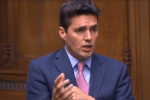Leaving the EU
A large number of constituents have contacted me regarding the current process around Britain leaving the European Union.
I have a dedicated section of my website which contains the position I took in the EU Referendum and my views on the withdrawal process and the outcome I am looking for Britain and the EU to reach. In order for constituents to keep updated as to progress, I will also upload the various position papers and speeches from the EU and Government teams and reports from Parliamentary committees and the House of Commons library. This will be updated via my newsletter which you can receive if you reply by email me with your confirmation. The current weblink is as follows:
https://www.huwmerriman.org.uk/campaigns/leaving-eu
With the referendum result being won by the majority who voted to leave the EU, and with 492 out of 650 MPs voting to trigger Article 50, we are now in the mechanics of leaving the EU and negotiating a new relationship with our EU partners and with other countries across the world.
As I am sure you can appreciate, I cannot comment on every twist and turn of the negotiations or process but I hope that my views and comments on the following key issues are helpful:
Remaining in the Single Market and Customs Union
One of the strongest arguments from the Remain campaigners was that the upshot of Britain leaving the EU, but remaining within the Single Market, would mean we have to sign up to practically all of the rules of the EU and pay for something akin to membership. This model would mean that the UK would, despite these obligations, have limited influence as to how these rules are formed and shaped. I don’t believe this would be in the UK’s best interests.
I accept the referendum result which directs that we are leaving the EU. In order that we do not end up in the situation outlined above, I believe the UK must not only leave the EU but also the Single Market. If we were to remain in the Single Market, we would have to accept the judicial intervention of the European Court of Justice, which has to ensure that all of the nuances of the Single Market are being adhered to. This would be a contradictory position to take if we are supposed to be leaving the EU and its jurisdiction.
Working on the basis that we are leaving the EU and Single Market, it logically follows that we also need to leave the EU Customs Union. The EU Customs Union states that only the EU can enter in to trade agreements with countries outside the EU. To withdraw from the Single Market but remain in the Customs Union would mean that we would not have a voice in trade deals and it would paralyse our ability to negotiate with other countries in the UK’s best interests.
For constituents who do not wish to accept the outcome of the EU Referendum, and want to remain in the EU, I can understand why every attempt is being made to push for Britain to remain in the Single Market and the Customs Union. However, I would rather Britain grasps the opportunity to shape our own investment and trade opportunities once we leave the EU. This will drive even greater cooperation with international partners and could open the door to increased prosperity, growth and jobs for Britain as well as for less developed nations than those within the EU.
Negotiating a New Relationship with the EU
The Prime Minister has set out the Government's approach in the Article 50 letter and I found it to be positive and warm towards the remaining 27 member states. This detail is the best indicator of what our nation will look like on the day we leave the EU but, as with any negotiation, it will depend on the other side of the table. I feel that our trading and security interests are aligned across Europe so I very much believe what has been written in those 4 pages will be deliverable.
The UK Government has published papers on specific negotiating points and these can be found within the first link to my website.
The EU and the UK will have to work out the values of our assets and liabilities that relate to the EU. In the event that the UK is leaving behind assets of value then I would expect the EU to make a contribution. If the UK has committed to programmes which have obligations beyond 2019, then I can see the argument that these should be priced. There may therefore be an amount paid by one party to the other. This must be based on pricing the obligations, not with the EU demanding a fixed amount of money which it is not legally entitled to under Article 50 (which makes no mention of exit payments).
I recognise that the negotiations with the EU will be complex and will sometimes lead to fractious positions which will cause difficulties to constituents who hold strong views on EU membership. Having spent 7 years as a lawyer and negotiator for the Lehman Brothers estate, and having spent 18 tortuous months negotiating with one financial entity which was claiming billions from the estate, with the estate claiming billions from the financial entity, I accept the occasional public outbursts as part of the negotiation process. What ultimately allowed me to settle with the financial entity on behalf of the Lehman Brothers estate was the agreement that future banking for the entire estate would be conducted through this financial entity. I similarly believe that the differing positions which Britain and the EU may hold over the terms of our departure can be settled by the need for future trade and cooperation which mutually benefits both Britain and the EU.
Legislating for EU Withdrawal
When serving as a member of the House of Commons' Procedure Committee, I spent time with constitutional experts assessing how to ensure that EU legislation enacted by UK legislation would apply following Britain's departure from the EU. It appeared to me that we needed to find a mechanism to ensure that our entire body of UK legislation which derives from the EU remains applicable and lawful on the day we leave the EU. It is then down to Parliament to decide which laws it wishes to repeal thereafter. This is exactly what the EU Withdrawal Bill (formerly known as the Great Repeal Bill) will do. The Bill effectively transitions all EU driven legislation in a simple manner so, from day one of our exit, the same rules and regulations apply to the UK as existed when we were a member of the EU.
The alternative is to repeal some or all of this legislation and start again. This would be complex and take years to achieve and there is a risk that new legislation may not be as effective as the current laws we have in place. This could mean that the rights of workers and health and safety restrictions, amongst thousands of other laws, could be diminished.
Of the 498 MPs who did trigger Article 50, some refused to vote, at the second reading, for the EU Withdrawal Bill in September on the grounds that the Bill gives too much power to Government to decide how to bring these laws over to the UK statute book. Having read the Bill, I agree that some of the drafting needs additional work to ensure Parliament is sovereign. However, this is for the next stage of the bill, where we go through it line by line in the House of Commons. I have already made my drafting submissions and the Government appears ready to amend the Bill and give Parliament more power. Others who voted against the bill, but voted to trigger Article 50, need to explain why they reluctantly accepted that we are leaving the EU, but chose to vote against a bill which will preserve all of the rights and laws delivered to the UK by the EU. If they had an alternative Bill or approach then it may be easier to understand their position. No alternative was outlined, just the customary picking at holes. This gives the impression, as I said in my speech to the House of Commons during the second reading, that these MPs are playing politics on a matter where it has to be in everyone's interest, regardless of prior opinions, that we make a success of leaving the EU and deliver certainty and a new direction for our country. This is what drove my vote in support of the EU Withdrawal Bill.
It should also be noted that the subject of the EU Withdrawal Bill is not new legislation but dealing with existing legislation which is being transitioned over to continue after Britain leaves the EU. Somewhat ironically, much of this legislation, when created by the EU and originally brought in to law in the UK, or as driven by ECJ judgments, did not receive the Parliamentary scrutiny now being asked of it.
You can view my speech on the EU Withdrawal Bill Second Reading here: https://www.huwmerriman.org.uk/news/huw-speaks-eu-withdrawal-bill
Transition Period
The Government has referenced that it is open to a form of transition period between the day Britain leaves the EU and an additional implementation date. I am seeking more information on the reasons behind this idea. As stated, the EU Withdrawal Bill will ensure that all laws derived from the EU will continue to be effective in the UK on the day Britain leaves the EU. If there is a need to keep a period of continuity for business and citizens, it is better to ensure that none of the transferred legislation is repealed until such time that the UK as a whole is ready to think anew.
If a transition period would mean continuing to follow new Single Market legislation and European Court of Justice rulings within this period, it could create a more difficult separation process at the end of the transition period. Given the EU has itself referenced that its member states and institutions will need the final six months of the two year negotiation period to put the terms in to effect, the UK will have the same six months and longer when considering the update on progress which will be made during 2018.
I understand that business will often lobby for more time, rather than use that currently available. I did so when I worked in the legal and regulatory profession in financial services albeit I simultaneously planned for outcomes (as I am sure businesses are currently doing). The provision of this additional time could make it an even harder job to untangle the UK from the EU jurisdiction, and mean more payments to the EU which could be avoided. The resultant uncertainty and delay may not be good for businesses within the UK. I will closely follow developments on a transitional period.
I hope this communication provides you with more information about the process for Britain leaving the EU and my opinions on Britain's departure from the EU. I respect the wide-ranging and passionate views of my constituents on this matter and hope that, having set out my approach and views, opinions can be left to differ. The enormity of the negotiation process for leaving the EU means it will not be brief or straightforward. However, the majority of voters in the Referendum voted to leave the EU so I am focussed on making the best success of it.


